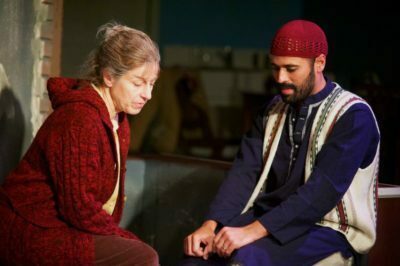Kabulitis
By Keith Anwar
Directed by Lavina Jadhwani
Produced by Polarity Ensemble Theatre
In association with Rasaka Theatre Company
At the Josephinum Academy, Chicago
Tall buildings shake, voices escape singing sad, sad songs
 The history of Afghanistan is a troubled one. Understatement of the day, I know, but it’s worth reminding just how difficult it has been for the mountainous country: an empire founded in the 18th century, it lost its independence to the British Empire and became a buffer state between Great Britain and Russia in the 19th century until it regained its independence – after the third Anglo-Afghan War – in 1919. Ten years later, the progressive monarch Amanullah Khan abdicated the throne and Nadir Khan took control briefly until his assassination in 1933, when his son ascended the throne. Hashim Khan, the boy’s uncle, effectively ruled for him. He ruled by allowing local tribes a greater amount of power – tribes that were, by all accounts, behind the times in regards to human rights, the rights of women, religion, and civil liberties. It was during this time that many progressive, intelligent, and talented young men who had been abroad returned, believing this to be the perfect time to bring Afghanistan up to modern times. Needless to say, they failed, and during the 1970s and 80s, America cleverly got involved in Afghanistan, allying themselves with the Mujahideen who were fighting off a Soviet occupation – an occupation that offered secularism, and gave women the right to work and an education and allowed them some control over marriage and other aspects of their lives that had, up to that point, been dictated by a strict reading of Islam. The Mujahideen eventually triumphed, and in 1996 the Taliban came to power, enforcing the policies of the Mujahideen. Then, in 2002, the United States invaded, because the Saudi Arabians who flew planes into the World Trade Center buildings in Manhattan and the Pentagon had been trained in the mountainous hinterlands of the country. The rest hardly needs commenting on, at this point, I believe.
The history of Afghanistan is a troubled one. Understatement of the day, I know, but it’s worth reminding just how difficult it has been for the mountainous country: an empire founded in the 18th century, it lost its independence to the British Empire and became a buffer state between Great Britain and Russia in the 19th century until it regained its independence – after the third Anglo-Afghan War – in 1919. Ten years later, the progressive monarch Amanullah Khan abdicated the throne and Nadir Khan took control briefly until his assassination in 1933, when his son ascended the throne. Hashim Khan, the boy’s uncle, effectively ruled for him. He ruled by allowing local tribes a greater amount of power – tribes that were, by all accounts, behind the times in regards to human rights, the rights of women, religion, and civil liberties. It was during this time that many progressive, intelligent, and talented young men who had been abroad returned, believing this to be the perfect time to bring Afghanistan up to modern times. Needless to say, they failed, and during the 1970s and 80s, America cleverly got involved in Afghanistan, allying themselves with the Mujahideen who were fighting off a Soviet occupation – an occupation that offered secularism, and gave women the right to work and an education and allowed them some control over marriage and other aspects of their lives that had, up to that point, been dictated by a strict reading of Islam. The Mujahideen eventually triumphed, and in 1996 the Taliban came to power, enforcing the policies of the Mujahideen. Then, in 2002, the United States invaded, because the Saudi Arabians who flew planes into the World Trade Center buildings in Manhattan and the Pentagon had been trained in the mountainous hinterlands of the country. The rest hardly needs commenting on, at this point, I believe.
 Kabulitis focuses on two periods in Afghan history: the return of the foreign-educated sons seeking reform, and the aftermath of invasion in 2002; this is done through a single family, a single person: Mildred (Caron Buinis), a Manhattan girl married to the Afghan Hamed (Gustavo Obregon) who is determined to reform his country. They traveled back to Kabul during the Second World War, but were eventually forced out because of the impending danger they faced. By 2002, Hamed has died and left a manuscript of a memoir of those times. His son, Rob (Jonas David Grey), wants to edit and publish it with the help of his mother, who has begun to feel the onset of Alzheimer’s. She hears the voices of men who caused her grief in Afghanistan – Da’ud and the Mullah (Kamal Hans and Plamen Pencheff, respectively) – now in her basement, and occasionally relives episodes of her life in Kabul, mistaking her granddaughter and nurse (Catherine Stegmann and Anupama Bhatt) for ghosts of memories of old times.
Kabulitis focuses on two periods in Afghan history: the return of the foreign-educated sons seeking reform, and the aftermath of invasion in 2002; this is done through a single family, a single person: Mildred (Caron Buinis), a Manhattan girl married to the Afghan Hamed (Gustavo Obregon) who is determined to reform his country. They traveled back to Kabul during the Second World War, but were eventually forced out because of the impending danger they faced. By 2002, Hamed has died and left a manuscript of a memoir of those times. His son, Rob (Jonas David Grey), wants to edit and publish it with the help of his mother, who has begun to feel the onset of Alzheimer’s. She hears the voices of men who caused her grief in Afghanistan – Da’ud and the Mullah (Kamal Hans and Plamen Pencheff, respectively) – now in her basement, and occasionally relives episodes of her life in Kabul, mistaking her granddaughter and nurse (Catherine Stegmann and Anupama Bhatt) for ghosts of memories of old times.
 It is a moving piece of theatre, done with care and concision and sympathy for all parties involved. Not to mention personal experience: the play is roughly based on author Keith Anwar’s family history. The humanity of the story is unbearable. The deterioration of age weighs heavily on the audience. And yet equally as moving – at least – is the story of Mildred’s life in Kabul. The triumphs and the imposing and finally impenetrable barriers that lay before her as a woman in Afghan society have the proper effect of revulsion, anger, sympathy, and helplessness. Kabulitis is a strong piece of theatre, and ultimately says something necessary and helps the audience understand and grasp the situation we’re in on the other side of the world a bit better.
It is a moving piece of theatre, done with care and concision and sympathy for all parties involved. Not to mention personal experience: the play is roughly based on author Keith Anwar’s family history. The humanity of the story is unbearable. The deterioration of age weighs heavily on the audience. And yet equally as moving – at least – is the story of Mildred’s life in Kabul. The triumphs and the imposing and finally impenetrable barriers that lay before her as a woman in Afghan society have the proper effect of revulsion, anger, sympathy, and helplessness. Kabulitis is a strong piece of theatre, and ultimately says something necessary and helps the audience understand and grasp the situation we’re in on the other side of the world a bit better.
Recommended
Will Fink
Reviewed on 9.30.11
For full show information, visit TheatreInChicago.
At the Josephium Academy, 1500 N. Bell Ave., Chicago, IL; visit https://www.petheatre.com/ or call 800-838-3006; tickets $15-19; Friday and Saturday at 8pm, Sunday at 3; running time is 110 minutes with intermission; through Oct. 30.

